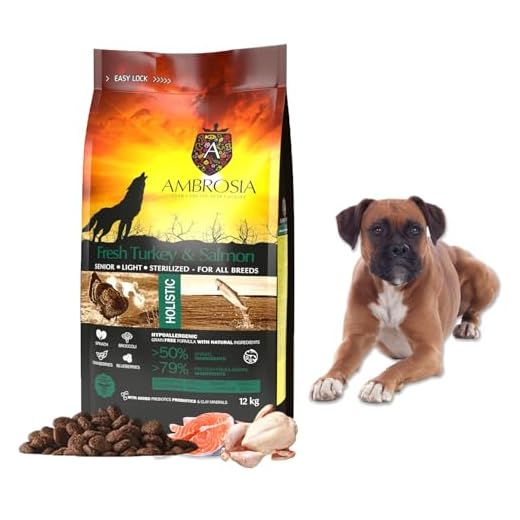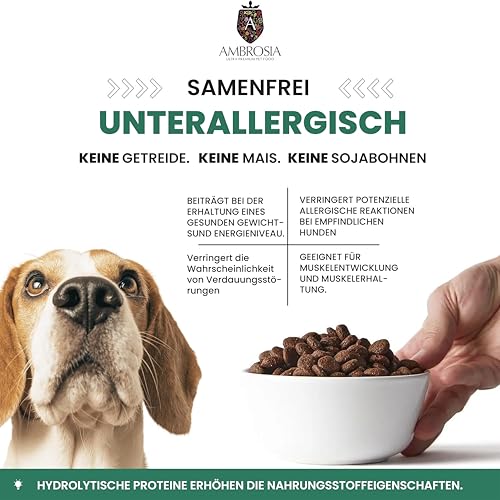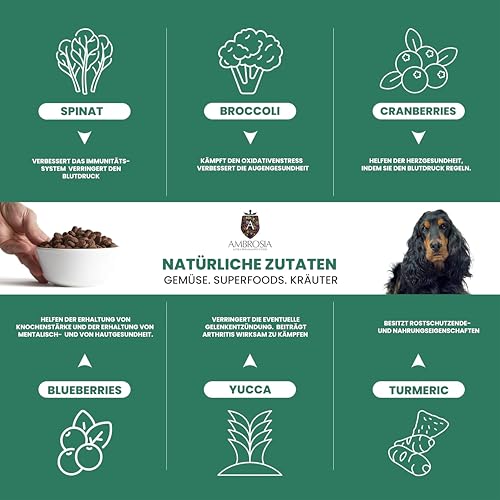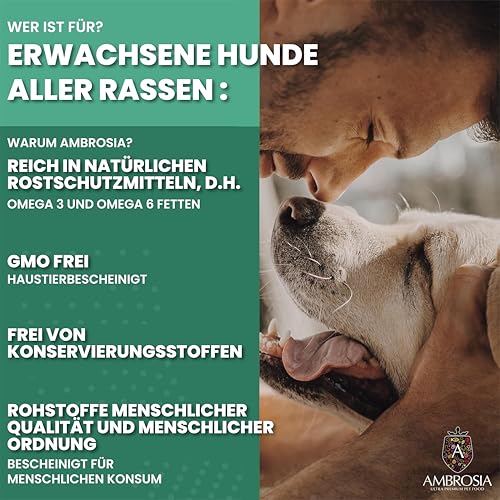








As a devoted pet owner, I understand the immense concern that arises when our senior dogs face health challenges. One of the more distressing issues is diarrhoea, which can significantly affect their well-being and quality of life. Addressing this problem involves not only understanding its root causes but also finding the right diet that can help manage and alleviate the symptoms effectively.
Through years of experience and numerous consultations with veterinarians, I’ve discovered that choosing the best dog food for senior dogs with diarrhoea requires careful consideration of their specific nutritional needs. Older dogs often have more sensitive stomachs and require a diet that is gentle yet nutritionally complete. Ingredients that support digestive health and provide balanced nutrition are crucial.
In this article, I’ll share my insights and recommendations on the best dog food options tailored for senior dogs suffering from diarrhoea. I’ll delve into the importance of high-quality ingredients, the role of dietary fibre, and the benefits of probiotics and prebiotics in promoting a healthy digestive system. Additionally, I’ll discuss how to transition your dog to a new diet and what signs to look for in monitoring their progress.
Ultimately, our goal is to ensure our senior dogs enjoy a comfortable and healthy life. By choosing the right food, we can significantly improve their digestive health and overall well-being, giving them the best possible care in their golden years.
Understanding Digestive Issues in Elderly Dogs
As our canine companions age, their digestive systems can become more sensitive, leading to issues such as loose stools. It’s important to recognise the signs and understand the underlying causes to provide the best care for our senior dogs.
One common issue in older dogs is chronic loose stools, which can be distressing for both the dog and the owner. There are several potential reasons behind this condition, and pinpointing the exact cause is crucial for effective treatment.
Causes of Digestive Problems in Elderly Dogs
There are multiple factors that can contribute to digestive issues in senior dogs:
- Dietary Changes: A sudden switch in food can disrupt your dog’s digestive balance. Older dogs often require a diet that is easier to digest and suited to their changing nutritional needs.
- Underlying Health Conditions: Conditions such as kidney disease, liver problems, or gastrointestinal disorders can lead to chronic loose stools. Regular veterinary check-ups are essential to monitor and manage these health issues.
- Medications: Certain medications can cause digestive upset as a side effect. If your dog is on medication, consult your vet to see if it could be affecting their digestive health.
- Stress and Anxiety: Just like humans, dogs can experience stress and anxiety, which can lead to digestive problems. Changes in routine or environment can be particularly challenging for older dogs.
Understanding these causes can help in managing and alleviating the symptoms of digestive upset in senior dogs. It’s always best to consult with a veterinarian to determine the most appropriate course of action for your dog’s specific needs.
Common Causes of Digestive Issues in Senior Dogs
As our canine companions age, they often encounter various health challenges, including digestive problems. Diarrhoea is a particularly common issue among senior dogs, and understanding the underlying causes can help in managing and preventing it. In this article, I will explore some of the prevalent reasons why older dogs may experience this discomforting condition.
One of the primary causes of diarrhoea in elderly dogs is dietary indiscretion. Older dogs might develop new food sensitivities or become less tolerant to certain ingredients that they previously digested without any issues. Additionally, their digestive systems can become more sensitive, leading to adverse reactions when their diet is abruptly changed or when they consume food that is not meant for them, such as table scraps.
Health Conditions and Infections
Chronic diseases are another significant factor that can lead to digestive troubles in senior dogs. Conditions such as kidney or liver disease, pancreatitis, and inflammatory bowel disease can all disrupt normal digestion and cause diarrhoea. It’s crucial to regularly monitor your dog’s health and consult a veterinarian if you notice any persistent changes in their stool or behaviour.
- Parasitic Infections: Intestinal parasites like worms can affect dogs of all ages but are particularly problematic for older dogs with weakened immune systems.
- Bacterial and Viral Infections: Senior dogs can be more susceptible to infections caused by bacteria (such as Salmonella or E. coli) or viruses (like parvovirus), leading to diarrhoea and other gastrointestinal symptoms.
- Medications: Some medications, especially long-term treatments for chronic conditions, can have side effects that include digestive upset and diarrhoea.
Stress and anxiety also play a significant role in a senior dog’s digestive health. Changes in their environment, such as moving to a new home, the arrival of new family members, or the loss of a companion, can trigger stress-induced diarrhoea. Keeping a stable and calm environment can help mitigate these effects.
In conclusion, while diarrhoea in senior dogs can arise from a variety of causes, understanding these common triggers can aid in prevention and effective management. Regular veterinary check-ups and a consistent, appropriate diet are key to maintaining your elderly dog’s digestive health.
Nutritional Priorities for Elderly Dogs with Digestive Issues
Caring for senior dogs who suffer from digestive problems like diarrhoea requires a specialised approach to their diet. As dogs age, their nutritional needs evolve, and when coupled with gastrointestinal disturbances, it becomes even more critical to tailor their food to support their health and well-being.
Understanding the specific dietary requirements of older dogs with diarrhoea can significantly improve their quality of life. It involves balancing the right nutrients, ensuring proper hydration, and selecting easily digestible foods that promote a healthy digestive tract.
Essential Nutrients and Dietary Considerations
To manage diarrhoea in senior dogs, several nutritional factors must be prioritised:
- High-Quality Protein: Older dogs need protein to maintain muscle mass and overall health. Choosing easily digestible protein sources such as chicken, lamb, or fish can help reduce digestive strain.
- Fibre: Adequate fibre is crucial for regulating bowel movements. Soluble fibre, found in ingredients like pumpkin or oats, can help firm up stools and improve gut health.
- Low-Fat Content: High-fat diets can exacerbate diarrhoea. Opt for foods with moderate to low-fat levels to ease the digestive burden on your senior dog.
- Probiotics: Including probiotics in your dog’s diet can support a healthy gut microbiome, which is essential for proper digestion and combating diarrhoea.
- Hydration: Maintaining proper hydration is vital, especially when dealing with diarrhoea. Wet food or adding water to dry kibble can help ensure your dog stays hydrated.
By focusing on these nutritional aspects, you can help manage your senior dog’s diarrhoea and improve their overall health. Regular consultations with a veterinarian can also provide tailored advice and adjustments to your dog’s diet as needed.
Ingredients to Consider for Dog Food When Managing Diarrhoea
When dealing with a senior dog experiencing diarrhoea, choosing the right ingredients in their food is crucial. As a pet owner, it’s important to focus on elements that can soothe the digestive system, provide necessary nutrition, and help firm up stools.
Opting for ingredients known for their digestive benefits and ease of absorption can make a significant difference. Here are some key components to include in your dog’s diet to manage and alleviate diarrhoea effectively.
Essential Ingredients for Digestive Health
Lean Protein: High-quality, easily digestible proteins such as chicken, turkey, or fish are ideal. These proteins are less likely to irritate the stomach and are essential for maintaining muscle mass and overall health in senior dogs.
Fibre Sources: Adequate fibre is crucial for digestive health. Ingredients like sweet potatoes, pumpkin, and brown rice provide soluble fibre, which helps absorb excess water in the intestines and adds bulk to the stool.
Probiotics and Prebiotics: Including probiotics, like Lactobacillus and Bifidobacterium, can help balance the gut flora, promoting healthy digestion. Prebiotics, found in ingredients such as chicory root, support these beneficial bacteria.
Low-Fat Content: A diet low in fat is often recommended for dogs with diarrhoea. Excess fat can exacerbate digestive issues, so look for foods with reduced fat content to ease the strain on your dog’s digestive system.
- Hydration Support: Ingredients such as bone broth can provide essential hydration and electrolytes, which are especially important when a dog has diarrhoea.
- Limited Ingredients: Foods with limited ingredients can help identify and eliminate potential allergens or irritants, making it easier to pinpoint what might be causing the digestive upset.
By focusing on these specific ingredients, you can help support your senior dog’s digestive health and manage diarrhoea more effectively, ensuring they stay comfortable and healthy.
Ingredients to Steer Clear of in Food for Elderly Dogs
As our beloved dogs age, their dietary needs evolve, requiring us to be more vigilant about what goes into their food bowls. Senior dogs often have sensitive digestive systems, and choosing the wrong ingredients can exacerbate health issues like diarrhoea.
Understanding which ingredients to avoid can make a significant difference in maintaining their well-being. By steering clear of certain harmful components, we can help ensure our senior dogs enjoy a comfortable and healthy life.
Harmful Ingredients to Avoid
Here are some ingredients that should be excluded from the diet of an elderly dog:
- Artificial Additives: Preservatives, colours, and flavours can be harsh on a senior dog’s stomach and may trigger allergic reactions or digestive issues.
- Fillers: Ingredients such as corn, soy, and wheat are often used to bulk up dog food but offer little nutritional value and can cause digestive distress.
- By-products: These are the leftover parts of animals not fit for human consumption. They can be of questionable quality and are harder for senior dogs to digest.
- High-fat content: Too much fat can lead to obesity and pancreatitis in older dogs. It’s essential to choose foods with moderate fat levels that align with their reduced activity levels.
- Dairy: Many dogs are lactose intolerant, and dairy products can cause diarrhoea and stomach discomfort, especially in older dogs.
Avoiding these ingredients can help in managing your senior dog’s digestive health, keeping them active and happy in their golden years.
Recommended Brands of Dog Food for Elderly Dogs with Digestive Issues
As our furry friends age, their dietary needs often change, requiring us to find specialised food to support their health. When dealing with senior dogs experiencing digestive issues like diarrhoea, it’s essential to choose a food that is gentle on their stomachs while providing all the necessary nutrients.
From my experience and research, I have identified several dog food brands that cater specifically to the needs of senior dogs with sensitive stomachs. These brands focus on high-quality ingredients, easily digestible proteins, and added probiotics to promote gut health.
Noteworthy Brands to Consider
Here are some of the brands that I found particularly beneficial for elderly dogs with diarrhoea:
-
Hill’s Science Diet: This brand offers a range of foods formulated for senior dogs with digestive issues. Their recipes often include a blend of prebiotics and fibre to support digestive health, along with high-quality proteins and essential nutrients.
-
Royal Canin: Known for their veterinary diets, Royal Canin has specific formulas designed to aid digestion in senior dogs. Their gastrointestinal lines are particularly effective, incorporating easily digestible proteins and balanced fibre to manage diarrhoea.
-
Blue Buffalo: Blue Buffalo’s natural recipes are excellent for older dogs with sensitive stomachs. Their senior lines often feature wholesome grains, real meat, and probiotics to support digestive health and overall well-being.
-
Purina Pro Plan: With a focus on targeted nutrition, Purina Pro Plan offers formulas that cater to the unique needs of senior dogs. Their Sensitive Skin & Stomach line includes options specifically for older dogs, featuring salmon as an easily digestible protein source.
-
Nutro Ultra: Nutro Ultra provides a holistic approach to senior dog nutrition, with recipes rich in antioxidants and easily digestible ingredients. Their senior blends are designed to be gentle on the stomach while providing complete nutrition.
When selecting food for a senior dog with digestive issues, it is always advisable to consult with a veterinarian to ensure the chosen brand and formula meet your dog’s specific needs. Each dog is unique, and finding the right balance of nutrients and digestibility is key to maintaining their health and comfort.
Homemade Dog Food Recipes for Senior Dogs with Diarrhea
Soothing a senior dog’s upset stomach can be challenging, but homemade food can provide relief. Here are simple recipes to settle your dog’s tummy:
Chicken and Rice: Boil boneless, skinless chicken with white rice until fully cooked. Remove excess fat, shred the chicken, and mix it with cooked rice for a bland, easily digestible meal.
Pumpkin and Turkey: Cook lean ground turkey and mix it with canned pumpkin (not pie filling). Pumpkin is high in fiber, which aids digestion, while turkey provides lean protein.
Beef and Sweet Potato: Brown lean ground beef and mix it with mashed sweet potatoes. Sweet potatoes are rich in vitamins and easy on the stomach, while beef offers a change in protein source.
Vegetable Broth Rice: Cook rice in low-sodium vegetable broth for added flavour and nutrients. The broth can help keep your dog hydrated while providing easily digestible carbohydrates.
These homemade recipes can provide relief for your senior dog’s diarrhea, but always consult your vet before making significant changes to their diet.
Transitioning to a New Diet: Helpful Advice
When shifting your senior dog to a new food, it’s crucial to do so gradually. Start by mixing a small amount of the new food with their current food. Over the course of a week or so, increase the proportion of the new food while decreasing the old one. This gradual transition can help prevent digestive upsets.
Monitor your dog’s response closely during the transition. If you notice any signs of discomfort or digestive issues, slow down the transition process. It’s also wise to consult your vet before making any dietary changes, especially if your dog has specific health concerns.
Key Tips for Transitioning:
- Gradually mix new food with old
- Monitor for digestive issues
- Consult with a vet if needed
Additional Supplements for Senior Dogs with Digestive Issues
When addressing digestive issues in senior dogs, additional supplements can play a crucial role in supporting their overall health. One beneficial supplement is probiotics, which help to maintain a healthy balance of gut bacteria. Probiotics can aid in digestion and reduce the severity of diarrhoea episodes.
Another helpful supplement is digestive enzymes, which assist in breaking down food and improving nutrient absorption. This can be especially beneficial for senior dogs with weakened digestive systems. Additionally, fibre supplements can help regulate bowel movements and reduce the occurrence of diarrhoea.
- Probiotics: Aid in digestion and reduce diarrhoea severity.
- Digestive Enzymes: Assist in breaking down food and improving nutrient absorption.
- Fibre Supplements: Help regulate bowel movements and reduce diarrhoea occurrence.
When to Consult a Vet for Your Dog’s Diarrhea
While mild cases of diarrhea in senior dogs can often be managed at home, there are times when it’s crucial to seek veterinary care. Here are some signs that indicate you should consult a vet:
- Persistent Diarrhea: If your dog’s diarrhea persists for more than 24 hours, it’s time to see a vet. Chronic diarrhea can lead to dehydration and other health issues.
- Blood in the Stool: The presence of blood in your dog’s stool can indicate a serious underlying issue such as parasites, infections, or inflammatory bowel disease.
- Severe Symptoms: If your dog is vomiting, lethargic, or showing signs of abdominal pain, seek immediate veterinary care.
- Underlying Health Conditions: Senior dogs with pre-existing health conditions such as kidney disease, liver disease, or cancer may need special care and attention when they have diarrhea.
Remember, it’s always better to be safe than sorry when it comes to your dog’s health. If you’re unsure whether your dog’s diarrhea warrants a trip to the vet, it’s best to err on the side of caution and seek professional advice.
Best Dog Food For Senior Dogs With Diarrhea
Features
| Part Number | HARRLR-18 |
| Model | HARRLR-18 |
| Color | Lamb |
| Release Date | 2019-10-17T00:00:01Z |
| Size | 18 kg (Pack of 1) |
| Price history for Harringtons Complete Adult Dog Food 18kg | |
|---|---|
|
Latest updates:
|
|
Features
| Part Number | 1NU06595 |
| Model | 052742181103 |
| Release Date | 2017-02-28T00:00:01Z |
| Size | 1 g (Pack of 4320) |
| Language | Italian |
| Price history for Hill's Prescription Diet Canine I/D 12x360g | |
|---|---|
|
Latest updates:
|
|
Features
| Color | BROWN |
| Size | 12 kg (Pack of 1) |
Features
| Part Number | VE-026 |
| Model | VE-0132 |
| Warranty | See pack for best before end date |
| Color | White |
| Release Date | 2013-05-03T00:00:01Z |
| Size | 60 Count (Pack of 1) |
Features
| Part Number | 5060084772274 |
| Model | 5060084772274 |
| Warranty | 1 year manufacturer |
| Color | Bondi Blue |
| Size | 12 kg (Pack of 1) |
| Language | English |
Features
| Size | 48 count (Pack of 1) |
| Price history for Royal Canin Digestive Care Wet Dog Food | |
|---|---|
|
Latest updates:
|
|
Features
| Part Number | 12231689 |
| Model | 12531980 |
| Color | transparent |
| Release Date | 2014-05-23T00:00:01Z |
| Size | 1 count (Pack of 1) |
Features
| Part Number | 769654 |
| Model | 180923/3446 |
| Color | white |
| Size | 7 kg (Pack of 1) |
| Language | English |
Q&A:
What is the best dog food for senior dogs with diarrhea?
The best dog food for senior dogs with diarrhea is one that is highly digestible and contains easily digestible proteins, such as chicken or turkey. Look for a food that is low in fat and has a high fiber content to help firm up stools. Avoid foods with artificial ingredients or additives, as these can further upset your dog’s stomach.
How can I help manage diarrhea in my senior dog?
Managing diarrhea in senior dogs involves feeding a bland diet of easily digestible foods, such as boiled chicken and rice. Ensure your dog has access to plenty of fresh water to prevent dehydration. You can also add a probiotic supplement to your dog’s diet to help restore balance to their gut flora. If the diarrhea persists, consult your vet for further advice.















































